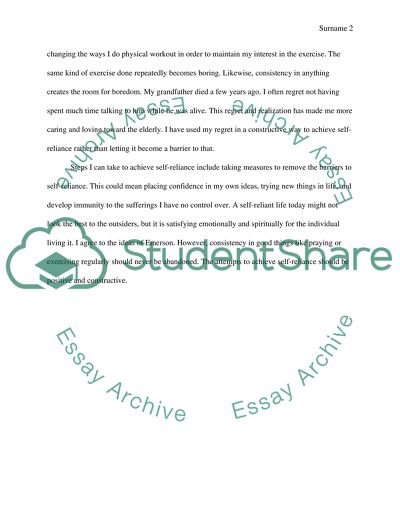
Self-Reliance: Paragraphs Summary & Analysis. Self-Reliance: Paragraphs LitCharts assigns a color and icon to each theme in Self-Reliance, which you can use to track the themes throughout the work. Emerson includes three epigraphs, one that translates as “Do not seek for things outside of yourself,” another from a poem by Beaumont and Fletcher that emphasizes Nov 13, · Emerson Self Reliance The essay “Self-Reliance”, by Ralph Waldo Emerson, is a persuasive essay promoting the ways of transcendentalism. He uses this paper to advance a major point using a structure that helps his argument. In the paper, Emerson begins his concluding thoughts with a statement that greater self-reliance will bring a revolution Self Reliance and Other Essays Summary and Analysis of Nature Ralph Waldo Emerson first published Nature in The essay served as one of the founding documents of the Transcendental Club, whose members would come to include future Transcendentalist luminaries like Henry David Thoreau, Margaret Fuller, and Bronson blogger.comted Reading Time: 6 mins
About Self-Reliance
Published first in in Essays and self reliance essay summary in the revised edition of Essays"Self-Reliance" took shape over a long period of time. Throughout his life, self reliance essay summary, Emerson kept detailed journals of his thoughts and actions, and he returned to them as a source for many of his essays. Such is the case with "Self-Reliance," which includes materials from journal entries dating as far back as In addition to his journals, Emerson drew on various lectures he delivered between and The first edition of the essay bore three epigraphs: a Latin line, meaning "Do not seek outside yourself"; a six-line stanza from Beaumont and Fletcher's Honest Man's Fortune ; and a four-line stanza that Emerson himself wrote.
Emerson dropped his stanza from the revised edition of the essay, but modern editors have since restored it. All three epigraphs stress the necessity of relying on oneself for knowledge and guidance.
The self reliance essay summary has three major divisions: the importance of self-reliance paragraphsself-reliance and the individual paragraphsand self-reliance and society paragraphs As a whole, it promotes self-reliance as an ideal, even a virtue, and contrasts it with various modes of dependence or conformity.
Because the essay does not have internally marked divisions delineating its three major sections, readers should number each paragraph in pencil as this discussion will make reference to them. Previous Glossary. Next Paragraphs Removing book from your Reading List will also remove any bookmarked pages associated with this title. Are you sure you want to remove bookConfirmation and any corresponding bookmarks? My Preferences My Reading List. Literature Notes Test Prep Study Guides.
Emerson's Essays Ralph Waldo Emerson. Home Literature Notes Emerson's Essays About Self-Reliance. Summary and Analysis of Self-Reliance About Self-Reliance, self reliance essay summary. Adam Bede has been added to your Reading List! Ok Undo Manage My Reading list ×. Ok Manage My Reading list ×. Remove Cancel ×.
\
, time: 4:58Self Reliance and Other Essays Self-Reliance Summary and Analysis | GradeSaver

Summary: “Self-Reliance” “Self-Reliance” is one of the most famous and representative works of the transcendentalist philosopher/author Ralph Waldo Emerson. Transcendentalism was a literary and philosophical movement of the early- and midth century in the United States. Transcendentalist works stress the purity and goodness of individualism Self Reliance and Other Essays Summary and Analysis of Nature Ralph Waldo Emerson first published Nature in The essay served as one of the founding documents of the Transcendental Club, whose members would come to include future Transcendentalist luminaries like Henry David Thoreau, Margaret Fuller, and Bronson blogger.comted Reading Time: 6 mins Self-Reliance: Paragraphs Summary & Analysis. Self-Reliance: Paragraphs LitCharts assigns a color and icon to each theme in Self-Reliance, which you can use to track the themes throughout the work. Emerson includes three epigraphs, one that translates as “Do not seek for things outside of yourself,” another from a poem by Beaumont and Fletcher that emphasizes
No comments:
Post a Comment